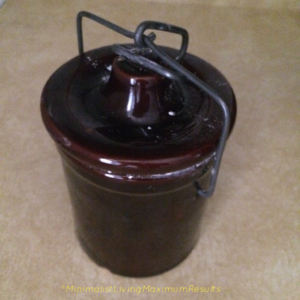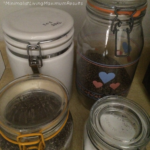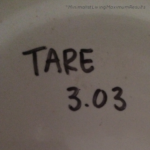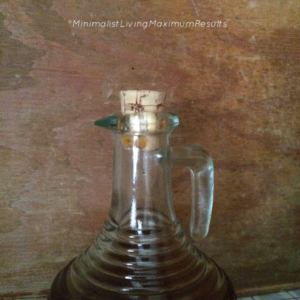A Simple Guide to Buying in Bulk

For us, buying in bulk has been a great way to reduce our carbon footprint by producing less waste. We try to buy all of our dry goods in bulk and even go the extra step of trying to use our containers.
Since buying in bulk can be tricky, it is always a good idea to have a good grasp of what this means before you dive in headfirst. A beginner's guide to buying in bulk can make you feel ready to give it go.
We wanted to break it down as much as possible but still provide a simple approach to buying in bulk. Here is the why, how and so much more for the ultimate guide to buying in bulk.
Disclosure: Links throughout the Mindful Nomadics site may make us a small commission at no additional cost to you. See our Affiliate Disclosure for more information.
Contents
Why Buy in Bulk
The Environment

Why is buying bulk good for the environment? The main reason is that you can use less plastic.
There are two main ways that less plastic is used when buying in bulk.
# 1 - Less plastic needed for containers
The amount of plastic in the “big” container is typically less than if you bought the same amount in a bunch of small containers. There is also the time in the factory and resources required to make a bunch of little containers compared to just one big. You can also try to only buy bulk items found in glass jars or at least recyclable materials.
# 2 - Using reusable containers
Now, there is an even better option for decreasing the use of plastic and that is bringing in your reusable containers. Even if you have a plastic container, that same plastic container can be used over and over again meaning more plastic is not being made.
You could be even more environmentally sound and use glass containers. To go that extra step you should get your glass containers from thrift stores.
How to Buy in Bulk
Get Jars

For buying un bulk the first step in bringing in jars. Some stores have jars at their store but we have noticed most only have plastic bags. Since we're trying for less waste, reusing plastic bags every time is not a good option.
Our strategy is to make every effort to help the environment. We start by buying ALL OF OUR JARS from thrift stores. We will also reuse jars that we originally bought with something else inside such as coconut oil.
Glass jars are best, but also make sure each jar has a lid that stays on tight. We have found some that screw on, some that have a cork, and some that have some type of latch mechanism.
There are a lot of cute jars out there but don’t be fooled. We once bought a jar because Kelsey thought it was perfect for the kitchen. We put some dish soap in it and during a move, we ended up with a very soapy back seat of our car.
Now we only use jars that all share the same size lid. This was to help with organization and we love the look. Plus we KNOW the lids are secure.
Find a Store
Hopefully, one day more stores will have bulk selling options but for now you have to put some time into finding a store. You need to make sure they sell in bulk and let you use your jars.
We typically do some internet searching to find a store that not only sells bulk items but allows you to bring in your jars. Sometimes we get lucky and find stores close by but other times you may have to plan it into a road trip.
Just remember, not all stores will let you bring your containers even if they have a bulk section. So far we have found that Sprouts and Winco both have bulk sections but do not seem to allow the customer to bring in containers.
Get Jars Ready
From here, we get all of the jars organized and get an idea of what we want in each. This is so we don’t overspend and end up getting items we won’t use. We make sure all of our items are tared, then fill them up.

If you don't know how much your jars weigh, that’s okay. The lingo you need to know is called a tare.
Simply ask the stores if they will tare your jars. Do this before you fill them up. This way when you check out, you only get charged for the contents in the jars, not the jars themselves.
Cashing out
When you go to the cashout, just make sure you have written down what each jar has. After paying, remember to take your items home in your nice reusable bag.
Take pictures of the items you are getting. This means you save on paper by not having to write down the items.
Plus this makes sure you have everything on hand that the cashier may need. Sometimes items have numbers, other times it’s a very specific name.
Items
Since we have been buying in bulk, here are all the items we typically buy.
| Popcorn Kernels | Beans | Nuts | Peanut Butter |
| Syrup | Vinegar | Rice | Quinoa |
| Couscous | Spices | Teas | Liquid Castile Soap |
| Coffee | Chia Seeds | Nutritional Yeast | Flour |
Keep in mind this is just what we have bought but there are tons of other options. All of these items are staples in our whole-food, plant-based diet.

Quick Tips
- Find a store where you can bring your containers
- Buy your containers at thrift stores, preferably glass
- Find containers that stay shut
- Look for bulk items sold in glass jars
- Call stores ahead of time to get their policies on bulk goods
- Don’t forget to look for organic
- Only buy what you need
- Don’t forget your reusable bag
We hope this simple guide for buying in bulk makes the process appear less daunting. It is a great way to help the environment. Please go out and give it a try!




